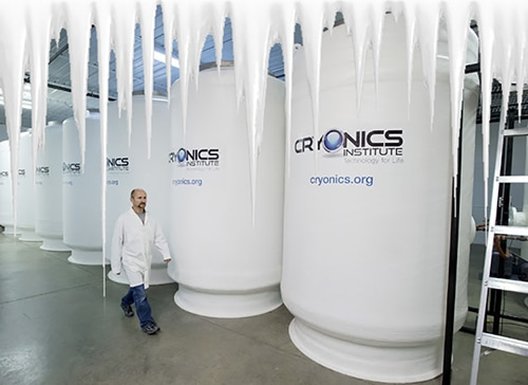No, her desire was not symbolically tied to the popular Disney movie (“Frozen”); rather, her request stemmed from a much more serious need. The fourteen-year-old girl, known as JS, suffered from a rare form of cancer, such that there was nothing modern medicine could do to remedy her terminal condition.
Knowing that her fate was sealed, JS searched the Internet to see if anything could be done to extend her life of just fourteen years. She came across cryonics and spent her final months researching the controversial process in which humans are frozen with the hope of reviving them sometime in the future, when medical advances presumably will make such resuscitation and extended life possible.
However, before contracting with one of just a few organizations in the world that practice cryonic preservation, JS had to surmount two other significant obstacles: 1) the high cost of the procedure, which ranges from $28,000 to $200,000, and 2) permission to undergo the process, since she was not of legal age.
Fortunately, her maternal grandparents raised the $46,000 that JS need to be preserved. However, a court battle ensued between the girl’s divorced parents: Her mother was in favor of the procedure, but her father was not. Shortly before JS passed away in a London hospital, Justice Peter Jackson ruled in favor of her mother, granting the dying girl’s request. After she passed, JS’s body was preserved and flown to the Cryonics Institute in Michigan where it’s now stored in a 10-ft.-high vat of liquid nitrogen.
The case of JS’s death and freezing is both fascinating and tragic, but what does it have to do with marketing ethics? Well, the organizations offering cryonics are marketing a service that an increasing number of people are considering despite its very high price. Again, the cost of cryonic preservation can range from $28,000 - $200,000. Of course, people ‘of means’ often pay that much or more for all sorts of other exclusive and possibly superfluous services, such as entertainment and travel, so why shouldn’t they pay handsomely to hold onto something far more valuable—their life?
The big difference is that when someone books something like a $50,000 European vacation, there’s a high probability that the trip will happen. However, when individuals undergo cryonics, the chance that anyone will ever see them alive again, not to mention healthy, is extremely slim. In fact, one might even say the possibility is virtually nonexistent.
Despite the fact that cryonics has been used for about 50 years, no human being has been successfully unfrozen. Science has no real track record for bringing people back to life. Yes, there have been instances in which people have “died” on operating room tables, etc., and miraculously kept living. There was even a case in 2015 in which a Pennsylvania man was revived after spending 12 hours unconscious in the snow, while temperatures dipped to minus 4 degrees Fahrenheit.
In such situations, it’s questionable whether the subjects had truly passed. In the case of cryonics, however, people must be legally dead before they can be frozen (freezing live subjects is not allowed), which of course adds another degree of difficulty: It’s not ‘just’ a matter of carefully thawing a previously frozen living person; medical technicians also somehow need to bring that person back from the dead. Then, after performing that miracle, they must solve other significant issues, like curing the person of the advanced-stage disease that killed him or her.
All this to say, someone who purchases a cryonics contract is far from holding a guarantee of a second chance at life. These risk-takers are, however, recipients of an ever-so-slim ray of hope: Perhaps at some point in the future, science will discover a way to overcome death and cure currently fatal diseases. Maybe that hope is worth tens or hundreds of thousands of dollars when the alternative is certain, irreversible physical demise.
Cryonics isn’t the only industry to place a price tag on hope. Everyday, people spend significant money on many items that cannot promise positive outcomes. Certain surgeries are extremely risky with low rates of success. Likewise, there’s no guarantee that cancer patients who undergo radiation or chemotherapy will survive. Or, to take a completely different example, only the smallest fraction of people who play the lottery win. The rest enjoy just a brief period of belief, prior to the drawing, during which they imagine that they might be the winner.
So, what’s different when cryonics companies make a similar sale of hope? The main distinction is that other entities have shown they can succeed, or produce positive results. Some of their customers will, in fact, realize their wishes. However, again, cryonics has no history of success and its future prospects are extremely dim.
Furthermore, cryonics introduces an array of other ethical issues, especially if more and more people place hope in the uncertain science, for instance:
- Use of resources
- Responsibility for bodies if/when a cryonics organization closes
- Reintegration into society of people who have been dead for decades or centuries
So, should cryonics be offered at all? That’s a question that has significant spiritual implications, as well as environmental, financial, and social ones. I’ll simply suggest here that if it is, it should be framed as entirely experimental, such that people who participate essentially donate their bodies to science. Those individuals, then, should not be charged. Furthermore, only a limited number of select cases should be accepted—not everyone who wants to add another ten years to his or her life.
There are many positive outcomes that organizations legitimately promise and successfully deliver, some more reliably than others. Restoring to life the frozen deceased, however, is not a current reality, and it may never be one. Consequently, any over-inflation of such hope should be seen as “Single-Minded Marketing.”
Learn more about the Mindful Matrix and Mindful Meter.
Check out Mindful Marketing Ads and Vote your Mind!




 RSS Feed
RSS Feed